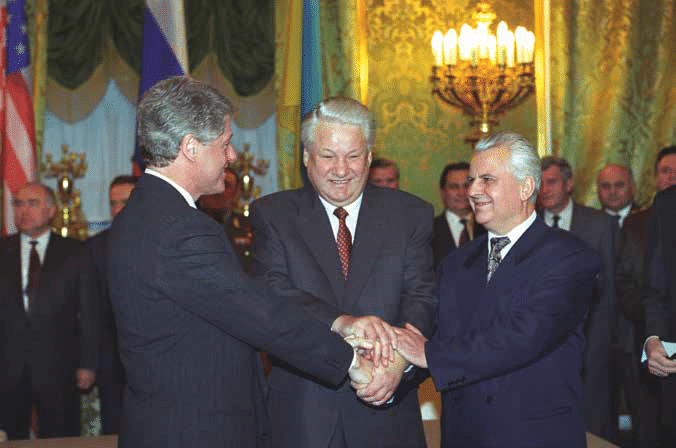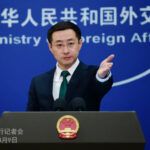Why security assurances are losing their clout as a nuclear nonproliferation instrument
By Ariel E. Levite | June 29, 2022
 US President Bill Clinton, Russian President Boris Yeltsin, and Ukrainian President Leonid Kravchuk sign the Trilateral Agreement on transferring nuclear weapons from Ukraine to Russia and associated matters in Moscow, January 1994. Photo credit: Joseph P. Harahan, historian of the Defense Threat Reduction Agency, and the Clinton Presidential Library.
US President Bill Clinton, Russian President Boris Yeltsin, and Ukrainian President Leonid Kravchuk sign the Trilateral Agreement on transferring nuclear weapons from Ukraine to Russia and associated matters in Moscow, January 1994. Photo credit: Joseph P. Harahan, historian of the Defense Threat Reduction Agency, and the Clinton Presidential Library.
Security guarantees have long served as powerful nonproliferation instruments, helping convince countries to cap and walk back their nuclear programs. It was the creation of NATO with Article 5 collective security guarantees at its core that made it possible to wean Germany off the nuclear weapons path. The same goes for the Warsaw Pact and Romania. Elsewhere, South Korea, Taiwan, and even Italy, Sweden, and Australia all had nuclear weapons ambitions at some point that were squelched by the offer of various US security commitments. It has been mostly vulnerable states, lacking such assurances, that have ventured to press ahead. The likes of South Africa, Pakistan, and Israel immediately come to mind.
Here the lessons of the most recent crisis with Ukraine come to mind. Ukraine was the only one (besides Russia, of course) of the four former Soviet republics that not only had Soviet nuclear weapons stationed on its soil during the Cold War, but actually had physical possession of these devices. It lacked only the activation codes needed to use the weapons; had it wanted to, Ukraine could have mastered triggering systems for the weapons in a matter of months. But in 1994, after much external prodding and internal soul searching, Ukraine agreed to give up on its precious nuclear possession in return for formal “assurances” for its security and territorial integrity anchored in the so-called Budapest Memorandum, co-signed by the United States, Russia, and the United Kingdom.
The memorandum was a weak instrument, lacking both the status of a treaty and a firm collective security formula of the nature that undergird NATO’s Article 5 assurance of mutual defense. It de facto repackaged the Organization for Security and Cooperation in Europe’s pre-existing commitments to member states, codifying a commitment to respect the territorial integrity of its members and refrain from the use of force to change borders. But the personal signature of the leaders of the three external guarantors sufficed to convince the Ukrainian elite to go ahead and quickly hand over all the weapons to Russia. Remarkably, President Xi subsequently extended similar Chinese security guarantees to Ukraine in 2013. It is this very diplomatic triumph that had made it possible to salvage the cornerstone of the nonproliferation regime—the Nuclear Non-Proliferation Treaty, which envisages no more than five nuclear states—that has now come back to haunt the world.
After all, Russia first reneged on its Budapest obligations in 2014 by unilaterally annexing Crimea and setting up two rebel enclaves in Donetsk and Luhansk. It has recently gone much further, recognizing the two as independent states, invading Ukraine, and challenging its very existence as an independent state, falsely claiming that Ukraine might actually pose a proliferation challenge by seeking to develop nuclear weapons of its own. While it is not in the cards now, would it be inconceivable down the road if Ukraine was forced not only to renounce its desire to join NATO but also give up on its demand for new ironclad security guarantees (“similar to NATO Article 5”) it is now seeking in the negotiations to end the war? After all, Ukraine does possess extensive nuclear knowledge and the infrastructure needed to field a nuclear weapons program if only as a lever to obtain security guarantees.
But Ukraine is not a singular case. And its sobering experience with the Budapest Memorandum and Russian invasion is not lost on both US allies and adversaries. Witness the recent decision by Finnish and Swedish governments, after reviewing their security posture in the aftermath of the Ukraine crisis, to abandon their long-cherished neutrality and apply for NATO membership. Similarly motivated Denmark, already a veteran NATO member, has also just decided in a national referendum to reverse course and terminate its EU security and defense op-out. And Germany, which as a leading NATO member has long benefitted from NATOs security guarantees and a US nuclear tripwire, was shocked enough by the Ukrainian crisis not merely to dramatically increase its defense budget but also end its long procrastination on renewing an aging fleet of dual-use nuclear delivery aircraft.
Now consider the impact on US adversaries like Iran and North Korea. They are bound to feel vindicated in their reluctance to contemplate any serious concessions in their nuclear pursuits. After all, they have long focused on the contrast between the fates of Muammar Khadafy and Saddam Hussein who lost their regimes and heads to foreign “aggression” once they gave up on their nuclear weapons programs, and that of Kim Jung Un (and his dynastic ancestors) who were able to save both by holding on to their prized nuclear possessions. Going forward then, we can be confidently surmise that neither harsh sanctions nor soft external security “assurances” would lure them to relinquish their nuclear assets. In fact, they may even feel compelled under the current circumstances to expand their nuclear holdings both to better protect themselves and to enhance their diplomatic clout.
In between is a third group of states, those that have thus far held back (or walked back) nuclear weapons program but may now be inclined to reconsider in light of a growing sense of vulnerability to attack or blackmail—especially those increasingly feeling threatened by the likes of China (Taiwan, Japan, South Korea, and Australia immediately come to mind) or Iran (the Gulf states and Saudi Arabia all the way to Egypt and Turkey) or Russia (the Baltic states as well as Poland). The United States and NATO are working with many of them to bolster their security. But most of these efforts are proving increasingly challenging to sustain, let alone scale up, when the US acutely feels both resource constraints and diminished political appetite for overseas commitments. It’s no surprise then to see the ever-growing public support in South Korea for either positioning of US nuclear weapons on its soil or acquiring an independent nuclear capability to hold at bay both North Korea and China.
Sanctions have historically been another potent tool the United States uses to dissuade adversaries and proliferators and reassure allies. But this much overused instrument is no longer proving either credible or comprehensive enough to impress on others that the United States masters both the resolve and the ability to fundamentally alter their and their adversaries’ cost-benefit calculus. Clearly, sanctions could not dissuade Russia from encroaching on any of its near abroad, dissuade Chinese militarization of the South China seas or terminate its intimidation of Taiwan, or reassure Ukraine about its future independence, let alone its territorial integrity. Just as crippling sanctions imposed on Iran in 2018 under the so-called Trump’s “maximum pressure” policy have failed to constrain Iranian nuclear advances, similarly intense pressure—reinforced by lofty promises of aid—could not whet North Korea’s appetite to reverse nuclear course.
Conventional arms transfer has also been frequently used by the US to stem proliferation by enhancing the confidence in and capacity of other states to defend themselves, by themselves, and in the process raise the price tag their aggressors will have to pay for taking them on. As is the case with Ukraine, such transfers are bound to remain a valuable tool in this arsenal, but their limitations are also now palpable. Conventional weapons by themselves have never possessed—even in the rare cases when they could be fielded affordably, in large quantity and quality—the unique ability to reassure and focus the minds the way nuclear weapons do. Endowing arms supplies with more cachet requires deployment of US troops as a “tripwire,” which brings us back to Washington’s reticence to undertake new such commitments.
This all adds up to a remarkably somber assessment of what the future holds in store. The United States, its European allies, and even a handful of others—such as those Ukraine now turns to provide it with fresh security guarantees, all the way from Poland, Turkey, and Canada to Israel—now have to agonize over how far they are able and willing to go to reassure other parties. Even in the unlikely event that a US administration would assume firmer new collective security commitments toward any additional party or parties, their value would be weakened by the uncertainty and delay in getting these ratified by the US Senate. This is not to mention the reawakened cache of isolationist/libertarian tendencies in the United States accompanied by explicit sympathy of some leading US political figures toward Russian President Vladimir Putin. This reality deprives the US of the sole mechanisms to endow its political commitments with congressional imprimatur that might provide others with some confidence about their endurance over time. But even if the Senate could be miraculously brought along to sanction new security treaties, their value appears uncertain, when presidents can unilaterally withdraw the United States at will even from binding commitments, as presidents of both parties have repeatedly done over time, as evidenced by US withdrawals from the Anti-Ballistic Missile, Open Skies, and Intermediate-Range Nuclear Forces treaties.
The problem with future security guarantees is not confined to political will to assume or sustain them; it goes further, to the capacity to deliver. The challenge of confronting and prevailing over ever more impressive Chinese military capabilities looks daunting, when considering how it increasingly challenge US supremacy not just in key classical conventional and nuclear area but also in cyberspace and more recently space as well. Emblematic of the situation is the growing anxiety on both Washington and Taipei about the credibility of US deterrence of Chinese aggression against Taiwan. If one further allows for the realistic prospect that Russia and China would extend further their collaboration in challenging US supremacy, while much of the rest of the world opts to sit on the sidelines, then the appetite to take on either of them on would be further diminished not only for the typically circumspect and divided Europeans but also for the presumably single-minded United States. This reticence is likely to be further reinforced by repeated demonstrations of the capacity of significantly inferior forces (such as those of Ukraine, Iran, and even Hezbollah) to exact a heavy cost from their foes should they be required to honor their security guarantees.
Consequently, for the foreseeable future, leaders of major countries will probably need to content themselves with the (re)emergence of clearly demarcated zones of influence, largely divided among Russia, China, and the US/NATO/EU, with states in these areas protected by explicit external commitments backed up by practical arrangements to defend them, if need be forcefully, using all available means. For the remainder, one should realistically anticipate ever-growing competition and, ranging from Africa to the Arctic and from cyberspace to outer space. With some sustained effort and ingenuity, world leaders can hopefully develop over time some rules of the road (and on the margins perhaps also new arms control arrangements) to govern the competition within and especially beyond the zones of influence and diminish the prospects of friction that escalates to violence and war.
This state of affairs presents rather stark choices for those states that do not neatly fit into any of the demarcated zone of influence or feel less confident that one of the major powers will actually come to their defense. To safeguard their political independence and protect their sovereign territory, they can try enticing one of the major powers to extend them security guarantees or credibly proclaim their neutrality. But both options will likely require them to enhance their indigenous capabilities and/or leverage them to secure more definitive security commitments. And here is where the lure of nuclear weapons is bound to be the greatest. The challenge will be to keep as many of them as possible no further along than nuclear hedging, while securing greatly enhanced multilateral arrangements (going well beyond the traditional single-minded focus on fissile materials) to monitor their nuclear status and provide timely early warning if they actually decide to weaponize their programs. Ultimately, though, the constant challenge will be to figure out to which countries one or more of the major powers or alliances will extend its security umbrella and which ones they may be unwilling to protect, knowing that leaving countries exposed runs the risk that they would elect to pursue an indigenous nuclear option.
Together, we make the world safer.
The Bulletin elevates expert voices above the noise. But as an independent nonprofit organization, our operations depend on the support of readers like you. Help us continue to deliver quality journalism that holds leaders accountable. Your support of our work at any level is important. In return, we promise our coverage will be understandable, influential, vigilant, solution-oriented, and fair-minded. Together we can make a difference.
Keywords: Article 5, NATO, Russia, Ukraine, nuclear proliferation, security assurances, security guarantees
Topics: Nuclear Weapons















This is an excellent discussion of one impact of Russia’s flamboyantly illegal, nuclear backed invasion of a neighbour. But we should also expect multiple negative consequences for international law and multilateral regimes. The absence of international institutions capable of effective enforcement is glaringly obvious, so it must be assumed that that the widening corrosive effects of Putin’s Special Military Operation for disarmament, arms control, and non-proliferation have only just begun.